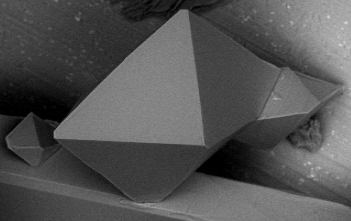

An enhanced geothermal system (EGS) is a renewable energy technology that extracts energy from a naturally occurring heat source. Many naturally occurring heat sources are under impermeable rock and EGS technology is used to access these resources through 'hydraulic stimulation'. EGS technology injects a fluid under high pressure, typically water, down into the rock subsurface, fracturing the rock and enabling access to the thermal reservoir. One of the challenges in this technology is mineral precipitation, e.g. formation of carbonates or low solubility sulfates, that can block pores and hence hinder extraction. This project aims to understand how the precipitation (nucleation) of these minerals occurs in different rock types.
| Sodium sulfate (Na2SO4) is a model system used in standard testing of the soundness of rock types, as it rapidly crystallises out of solution to form hydrates, such as sodium sulfate decahydrate Na2SO4(H2O)10, commonly called mirabilite, and metastable sodium sulfate heptahydrate Na2SO4(H2O)7. Crystal nucleation from solution is most likely to occur at the interface between the salt solution and the rock. The interface will play an important role in determining which hydrate is formed and its nucleation rate. This PhD project will take a combined experimental and simulation approach to understand the nucleation of sodium sulfate at different rock surfaces. |

|